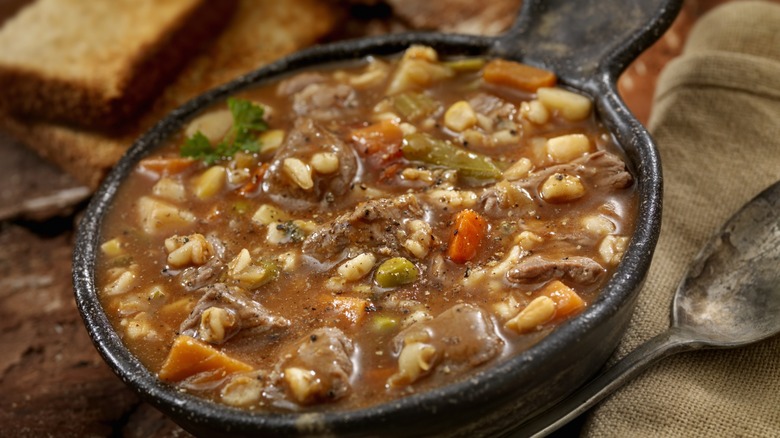Will Frozen Soup Lose Its Consistency?
As winter arrives, so does our desire for warm, comforting dishes. While simple recipes like one-pot casseroles are definitely at the top of our list, soups and stews are also essential meals of the season. Whether you opt for a stove-top recipe so you can keep a close eye on its progress, toss it in the slow cooker and let it simmer for hours, or add the ingredients to the Instant Pot for the easiest weeknight meal, your ideal soup recipe is out there, waiting to be made.
Unlike opening a can, making homemade soup generally means a lot of leftovers. According to FoodSafety.gov, soup will last about two to three months in the freezer. While that sounds promising for those wanting to make large batches to freeze for the winter, not every soup is going to maintain its consistency when frozen.
Soups that contain milk or cream separate and take on a gritty texture when thawed out. Re-blending the soup will often solve the problem, or you can just omit the milk initially and add it in once the soup is thawed.
Starches like pasta, rice, or potatoes shouldn't be frozen either, because they become soggy or gelatinized when reheated. A great alternative is to blend sweet potato, because of its lower starch content. If you are trying to freeze chicken noodle soup, it's best to add the noodles when you thaw it out.
Freezing it properly will help preserve your soup's flavor
Now that you know what kinds of soups you shouldn't freeze, the question is: Which ones do you? Broth and bean-based soups freeze the best, especially those chock-full of vegetables or proteins like chicken or ham. Most kinds of chili recipes will taste just as good when they're thawed out, and beef barley soup is a wonderfully hearty soup that you can freeze and eat again and again. Chicken and wild rice soup also freezes well due to wild rice actually being a type of grass.
If you want your frozen soup to taste just as flavorful as when you first made it, it's important not to rush. Before freezing your soup, let it cool completely, otherwise, there's a good chance it will develop freezer burn. Also, the soup will expand, so leave space at the top. If using a container, it's wise to plastic wrap between the lid and the soup to prevent any air from getting in, which can also cause freezer burn. Or bypass this problem altogether by storing your soup in a freezer-safe plastic bag — just make sure you get all the air out.
So now that your soup has been labeled and properly stored in your freezer, you want to eat it. The easiest solution is to put it in the fridge to defrost overnight, or in a warm ice bath. If your soup is in a microwaveable container, it's even quicker: Simply microwave it on 50% power, stirring occasionally.

